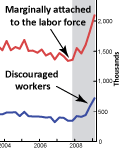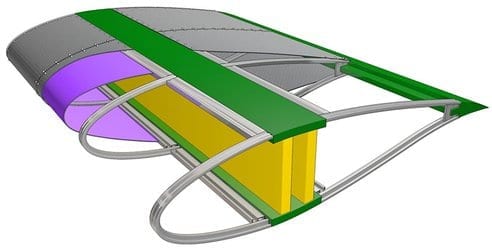It’s time to get started, before the robots and the robber barons turn our society into something unrecognizable.
The American economy is still, by most measures, deeply depressed. But corporate profits are at a record high. How is that possible? It’s simple: profits have surged as a share of national income, while wages and other labor compensation are down. The pie isn’t growing the way it should — but capital is doing fine by grabbing an ever-larger slice, at labor’s expense.
Wait — are we really back to talking about capital versus labor? Isn’t that an old-fashioned, almost Marxist sort of discussion, out of date in our modern information economy? Well, that’s what many people thought; for the past generation discussions of inequality have focused overwhelmingly not on capital versus labor but on distributional issues between workers, either on the gap between more- and less-educated workers or on the soaring incomes of a handful of superstars in finance and other fields. But that may be yesterday’s story.
More specifically, while it’s true that the finance guys are still making out like bandits — in part because, as we now know, some of them actually are bandits — the wage gap between workers with a college education and those without, which grew a lot in the 1980s and early 1990s, hasn’t changed much since then. Indeed, recent college graduates had stagnant incomes even before the financial crisis struck. Increasingly, profits have been rising at the expense of workers in general, including workers with the skills that were supposed to lead to success in today’s economy.
Why is this happening? As best as I can tell, there are two plausible explanations, both of which could be true to some extent. One is that technology has taken a turn that places labor at a disadvantage; the other is that we’re looking at the effects of a sharp increase in monopoly power. Think of these two stories as emphasizing robots on one side, robber barons on the other.
About the robots: there’s no question that in some high-profile industries, technology is displacing workers of all, or almost all, kinds. For example, one of the reasons some high-technology manufacturing has lately been moving back to the United States is that these days the most valuable piece of a computer, the motherboard, is basically made by robots, so cheap Asian labor is no longer a reason to produce them abroad.
In a recent book, “Race Against the Machine,” M.I.T.’s Erik Brynjolfsson and Andrew McAfee argue that similar stories are playing out in many fields, including services like translation and legal research. What’s striking about their examples is that many of the jobs being displaced are high-skill and high-wage; the downside of technology isn’t limited to menial workers.
via The New York Times – PAUL KRUGMAN
The Latest Streaming News: Unrecognizable society updated minute-by-minute
Bookmark this page and come back often
Latest NEWS
Latest VIDEO









